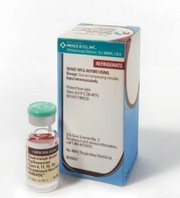 I'll credit Christy for alerting me to a developing story about Gardasil, a controversial new vaccine against cervical cancer approved by the FDA Friday.
I'll credit Christy for alerting me to a developing story about Gardasil, a controversial new vaccine against cervical cancer approved by the FDA Friday.
According to an AP story, "Gardasil protects against the two types of HPV responsible for about 70 percent of cervical cancer cases. The vaccine also blocks infection by two other strains responsible for 90 percent of genital wart cases." The FDA licensed it for use in girls and women 9 to 26. The vaccine is most effective if administered to girls between the ages of 9 and 13 or before they become sexually active.
Merck sells three-shot Gardasil series for $360. It's in demand. The AP reports, "Each year, cervical cancer kills an estimated 240,000 women worldwide, including 3,700 in the United States. The incidence of the cancer is lower in the U.S. because Pap tests are so routine."
Socially conservative groups have spoken out against the vaccine, claiming it will encourage sexual promiscuity. It's the same old argument that can be made for all forms of contraception. This controversy is different from my previous post about pharmacists' new ability to decline distributing the morning after pill in Washington State. That argument is more related to pro-life/pro-choice philosophies. This vaccine is about preventing sexually transmitted diseases, not birth control. Of course, both debates are related to a woman's control of her body, but this debate relates specifically to personal sexual responsibility.
I think that this vaccine is absolutely acceptable. No women should be forced to have to take the shot, but, so long as it's FDA approved, it should be an option - just like condoms or any other form of contraception that provides protection from sexually transmitted diseases.
Just because the spread of a disease is preventable (in this case via abstinence) doesn't mean we should refuse to help those affected by it. Even if a woman chooses to abstain from sex before marriage, her husband might not have, and she might need the protection of a vaccine anyway.
Like with HIV/AIDS and other STDs, we should and do make attempts to find vaccines and cures. We as a society should encourage moral standards, but what other standards can we encourage if we don't, as a moral foundation, champion helping one another first and foremost?